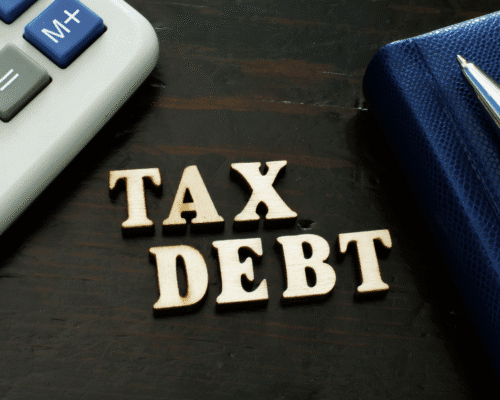What Happens to My Tax Debt When I File for Bankruptcy in Phoenix?

If you’re drowning in debt and considering bankruptcy, you’re probably hoping for a clean slate—including relief from back taxes. But when it comes to tax debt and bankruptcy in Phoenix, things can get a bit complicated. The IRS doesn’t always go away quietly.
So, can bankruptcy eliminate tax debt? The answer is sometimes. It all depends on the type of tax, how old it is, and whether you file Chapter 7 or Chapter 13. Basically, certain tax debts can be discharged while others stick around no matter what.
But don’t wait until the IRS is already knocking on your door. The earlier you speak with a professional, the more options you’ll have.
What’s the Difference Between Chapter 7 vs. Chapter 13 Bankruptcy?
Chapter 7 bankruptcy, often called liquidation, is designed for individuals with limited income who can’t repay their debts. It wipes out most unsecured debts—like credit cards and medical bills—without requiring repayment. In exchange, some assets may be sold to pay creditors.
Thankfully, Arizona law protects certain property through exemptions, like a portion of your home equity, vehicle, and household goods.
Chapter 13, on the other hand, is a reorganization plan. It allows you to keep your property while repaying some or all debts over three to five years. This option is ideal for those who have regular income but have fallen behind on mortgages, car payments, or taxes.
Both chapters halt creditor actions through an automatic stay, but Chapter 13 offers more flexibility and asset protection. Your choice depends on your income, assets, and long-term financial goals.
What Is Dischargeable Debt?
When you file for bankruptcy, your debts fall into two main categories:
- Dischargeable debts: These can be wiped out (like credit cards, medical bills, personal loans).
- Non-dischargeable debts: These survive bankruptcy (like child support, most student loans, and taxes, oftentimes).
When Can You Discharge Your Tax Debt Under Chapter 7?
Some income tax debt may be discharged under Chapter 7 if certain conditions are met. This is known as a tax debt discharge. Whether you qualify depends on the 3-2-240 rule. That means for income tax debt to be discharged in Chapter 7 bankruptcy, it must meet all of the following conditions:
- 3 years since tax was due: The return was due at least three years before you filed for bankruptcy (including any extensions).
- 2 years since filing: You must have filed the tax return at least two years before filing for bankruptcy.
- 240 days since assessment: The IRS must have assessed the tax at least 240 days before the bankruptcy filing (or not at all).
Additional Requirements:
- The return must not be fraudulent.
- You can’t have willfully evaded paying the taxes.
Chapter 7 Tax Debt: Total Wipeout
In Chapter 7 bankruptcy, the goal is liquidation. Your non-exempt assets (if any) are sold off by a trustee, and the proceeds are distributed to creditors. After that, qualifying debts are discharged.
If your tax debt meets the 3-2-240 rule and other conditions, it can be wiped out through Chapter 7 tax debt discharge. That means you’ll no longer owe that money, and the IRS can’t come after you for it.
However, most other types of tax-related debt (such as payroll taxes, penalties, or trust fund taxes) cannot be discharged under any chapter.
Chapter 13 Bankruptcy and Tax Debt Repayment
Chapter 13 bankruptcy works differently. Instead of eliminating your debts immediately, you enter a 3- to 5-year repayment plan based on your income and expenses.
When it comes to tax debt in Chapter 13, the rules are more flexible:
- Priority tax debts (recent income taxes, payroll taxes, etc.) must be paid in full over the plan’s term.
- Non-priority tax debts (older income tax debts that meet the 3-2-240 rule), such as credit cards or medical bills, can be partially repaid or even discharged.
This approach gives you time to catch up on IRS payments without interest and penalties piling up. It also puts an automatic stay on collection efforts, meaning the IRS can’t garnish wages or seize assets during the case.
Filing in Phoenix: State and Federal Taxes
In Phoenix and across Arizona, you may owe both federal and Arizona state income taxes. The same general rules apply to discharging state taxes as federal ones, but the details can vary slightly.
Fortunately, Arizona’s bankruptcy courts and trustees are familiar with the intricacies of tax debt bankruptcy in Phoenix, and a knowledgeable local attorney can guide you through the state-specific nuances.
When Should You Hire a Phoenix Bankruptcy Lawyer?
Navigating tax debt bankruptcy in Phoenix isn’t easy. Between IRS bureaucracy, bankruptcy court deadlines, and Arizona-specific rules, it’s a legal maze.
A qualified Phoenix bankruptcy lawyer can:
- Determine if your tax debt is dischargeable
- Advise whether Chapter 7 or Chapter 13 is better for you
- Help avoid mistakes that could cost you thousands
- Deal with IRS communications so you don’t have to
Talk to a Phoenix Bankruptcy Lawyer Today
Bankruptcy isn’t a one-size-fits-all solution. A knowledgeable Arizona bankruptcy attorney can help you determine the best path for your situation and regain control of your financial future.
If you have any questions about Arizona bankruptcy laws, talk to Cy Hainey at Hilltop Law Firm today. Cy is a bankruptcy attorney who’s been helping people in Phoenix get debt relief for over a decade.
Call (602) 466-9631 to schedule a FREE consultation with our Phoenix bankruptcy lawyer today. If you’re interested in a free Zoom meeting, someone from the Hilltop Law Firm office will be happy to help you set up your virtual meeting in advance.